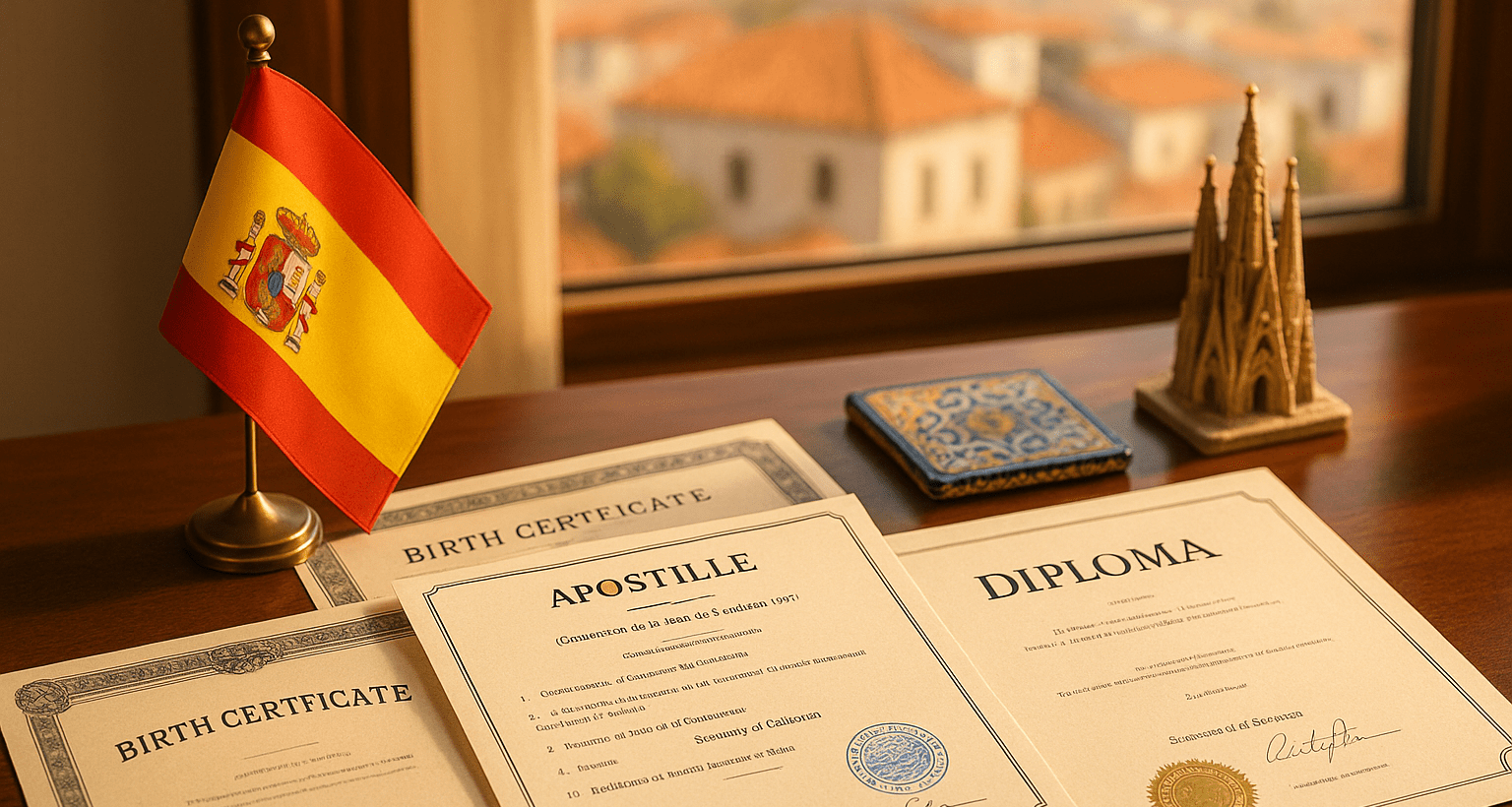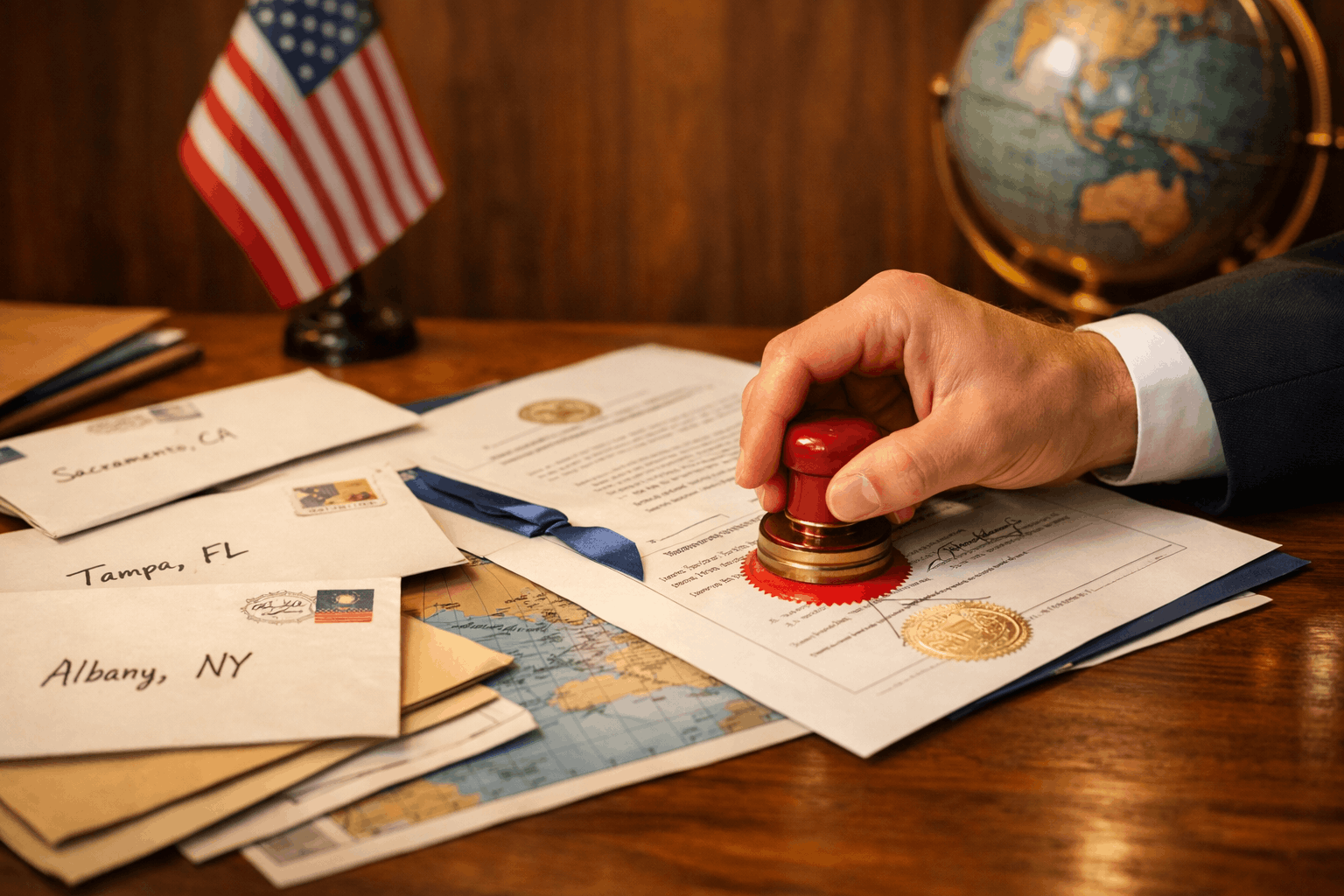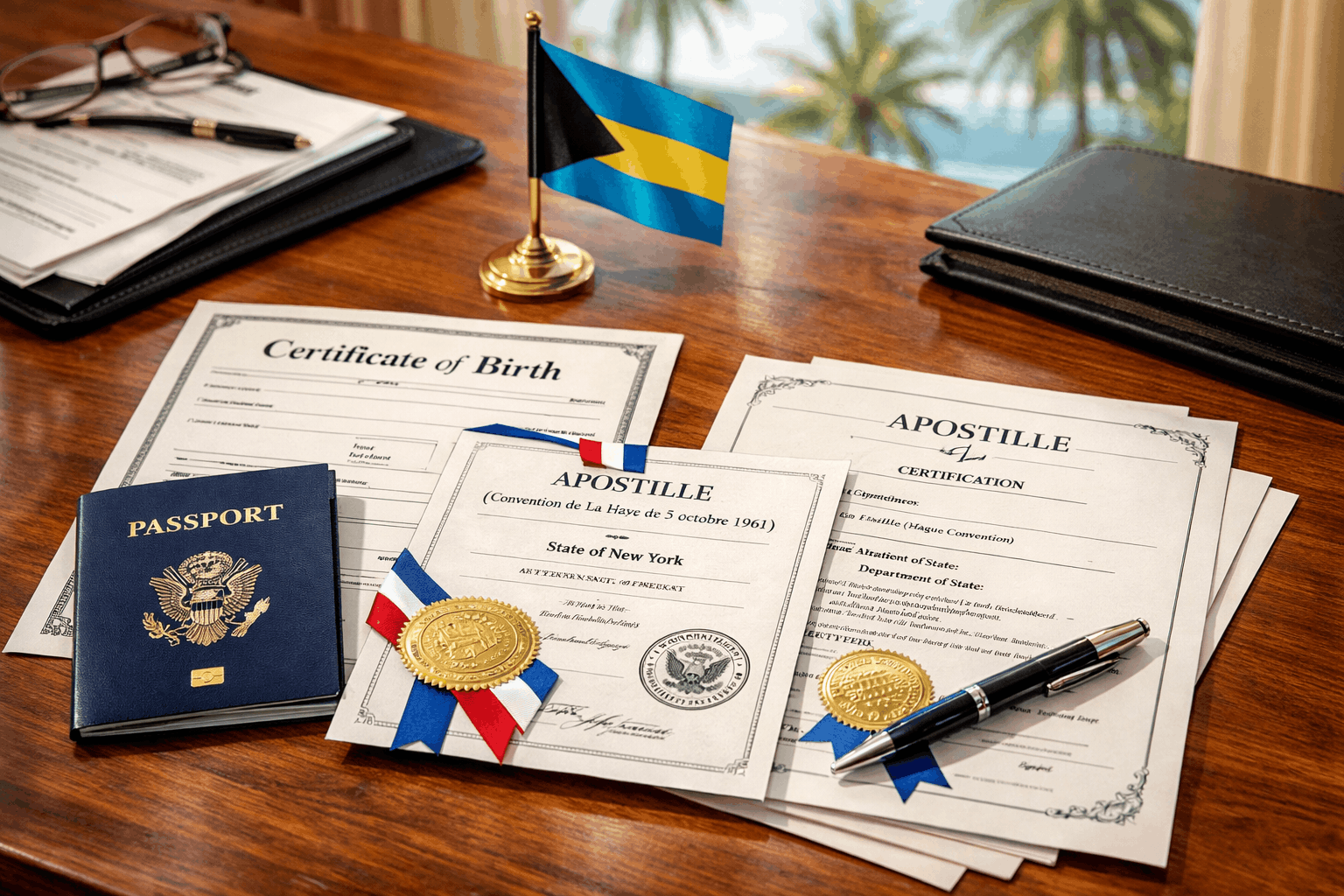
A Guide to Apostille Services for US Citizens Moving to Spain
Relocating overseas can be exciting, but it often involves lots of paperwork. If you’re moving to Spain from the US, you’ll quickly learn that Spanish authorities require many U.S. documents to be authenticated before they’re accepted. This authentication is done through an apostille — a simple yet crucial certificate that verifies your documents for international use.
Whether you’re applying for a visa, purchasing property, or setting up residency, understanding how to get an apostille will save you time and frustration. This blog explains which U.S. documents Spain typically requires, how the apostille process works, and why professional help can make all the difference.
Which U.S. Documents Does Spain Commonly Require with an Apostille
When you move abroad, different institutions (immigration offices, universities, etc) will ask for various records. These documents must be authenticated so that Spanish authorities recognize them as valid. Below are the main types of U.S. records that usually need apostilled documents for Spain.
Personal & Family-Related Documents
For most people, the first step involves personal or family paperwork. These documents include birth certificates, marriage and divorce records, death certificates, and adoption papers.
Each of these documents proves your identity or legal status and must come from an official U.S. source. For instance, a birth certificate must be issued by the state’s Department of Health and signed by the State Registrar, not by a local clerk. Similarly, a marriage certificate should come from the proper county office rather than the officiant who performed the ceremony.
Before requesting an apostille, check that your copy is certified and recent enough for international use. Spain often requires newly issued or revalidated documents, especially when they relate to marriage, adoption, or residency.
Criminal-Record and Background-Check Documents
Another common requirement involves background checks. Spanish immigration and visa applications almost always call for an FBI background check or state police clearance.
An apostille for Spain confirms that the signature and seal on your background report are authentic. If you’re applying for a long-term visa, residency, or work authorization, this step is essential.
The FBI background check must first be issued by the FBI’s Criminal Justice Information Services Division (CJIS) and then sent to the U.S. Department of State for apostille certification. State-level clearances follow a similar process but are handled by the Secretary of State’s office where the record was issued. Always confirm whether your visa type requires a federal or state document before proceeding.
Property, Business & Power-of-Attorney Documents
When you’re managing assets or business operations abroad, documents such as powers of attorney, property deeds, and incorporation papers need to be legalized. Moving to Spain often involves signing legal papers remotely, making notarization and apostille verification vital.
For example, a Power of Attorney (POA) allows someone to act on your behalf in Spain — whether it’s buying real estate, opening a bank account, or representing you in legal matters. Before getting an apostille, ensure that the POA is signed, notarized, and properly worded according to Spanish legal standards.
Corporate documents like articles of incorporation, business licenses, and shareholder resolutions also require authentication if they’ll be presented to Spanish authorities. Getting these papers apostilled ensures that your company’s records are recognized under the Hague Apostille Convention.
Academic & Professional Credentials
Students and professionals relocating abroad often must demonstrate their credentials. Diplomas, academic transcripts, teaching licenses, and professional certificates all fall under this category.
If you’re planning to study or work in Spain, schools or employers will require your credentials to be authenticated. Each document must bear the original signature of the school registrar or licensing board before you apply for an apostille.
Once certified, these documents confirm that your education or training meets official standards. Having apostille services for Spain handle your academic records helps avoid delays, especially if your documents come from different states.
Step-by-Step Process: How to Apostille US Documents for Spain
Getting an apostille may sound complicated at first, but it follows a simple sequence once you understand how it works. Below is a clear outline showing how to apostille US documents for Spain from start to finish.
Step 1 – Obtain the Correct Original or Certified Copy
Start by securing the right version of your document. The apostille authority will only accept originals or certified copies issued by the proper government office. Photocopies, scans, or notarized duplicates are not valid unless the notary explicitly certifies them.
For example, a certified birth certificate must carry a raised or embossed seal, an official signature, and an issuance date. Academic or business papers must include the original signature of the authorized representative.
Before moving forward, review the document carefully. Make sure the names, dates, and signatures are clear and consistent across all your paperwork. One of the most frequent reasons for rejection is mismatched details.
Step 2 – Notarisation & Other Preparatory Steps
Certain documents must be notarized prior to obtaining an apostille. This is especially true for personal affidavits, powers of attorney, and translated materials. The notary confirms your identity and ensures you voluntarily signed the document.
Once notarized, the document becomes eligible for state authentication. For official government-issued records like birth or death certificates, notarization isn’t necessary since these already come from an official source.
It’s also a good time to plan your apostille translation in Spanish if your documents will be used in Spain. Spanish authorities require certified translations for all foreign documents, including the apostille page itself. Preparing both at once saves time later.
Step 3 – Apply for the Apostille in the Issuing State or Federal Office
Once your documents are ready, submit them to the correct issuing authority. The process depends on where the document originated.
- State-issued documents. These include vital records, school transcripts, or notarized affidavits. You’ll need to send them to the Secretary of State in the state where they were issued. Each state has its own process, fee, and timeline.
- Federal documents. Items such as FBI background checks or documents from federal agencies must go through the U.S. Department of State’s Office of Authentications in Washington, D.C.
When applying, always include a cover letter with your contact details, the destination country (Spain), and your preferred return method. Make sure to provide a self-addressed return envelope if you’re applying by mail.
Processing times vary, but you can often request expedited handling for an additional fee. Using a professional service is also a good idea if you’re abroad or dealing with multiple states, as they can submit on your behalf and monitor progress closely.
Duration and Cost Overview
The timeline and price depend on where and how you apply. On average, state-issued apostilles take one to three weeks, while federal apostilles may take slightly longer due to verification steps. In-person requests are faster, sometimes completed within a few days.
Fees typically range from $10 to $20 per document at the state level, and around $20 per document for federal apostilles. However, courier costs and expedited processing can increase the total.
For those moving to Spain, the total expense usually depends on how many documents need authentication. If you’re apostilling a birth certificate, marriage certificate, and FBI background check, expect to spend around $100–$200, including mailing and service charges.
Planning early is key. Start gathering and authenticating your paperwork several months before your visa application. Doing so prevents delays that could interfere with your travel or residency timeline.
Common Apostille Errors When Submitting to Spanish Authorities
Even minor errors can lead to significant delays or rejections. Understanding common issues helps you avoid wasted effort and extra fees. Below are some of the most common errors encountered when processing apostille documents for Spain.
Using a Plain Photocopy Instead of an Original or Certified Copy
Spanish offices will not accept simple photocopies. Every document must be an official version issued by the relevant state or federal agency. If your document looks informal or lacks an embossed seal, it will likely be rejected. Always double-check that your copy is certified before mailing it for an apostille.
Not Having the Document Properly Notarised or Lacking the Required Signature or Seal
An absent notary seal, clerk’s signature, or registrar’s stamp can invalidate your entire application. Before sending a document for apostille, confirm it bears all the required elements. For notarized forms, ensure the notary includes a full statement.
Apostille Placed on the Wrong Document or by the Wrong Issuing Authority
Each document must be apostilled by the correct office. State-issued papers cannot be processed by federal agencies, and vice versa. Sending your birth certificate to the Department of State, for instance, will result in rejection. Always match the issuing level to the correct authentication body.
Missing the Spanish Translation When Submitting in Spain
Each foreign document must have a Spanish translation completed by a certified translator. Many applicants overlook this step, assuming that an apostille alone is enough. However, Spanish authorities require a translation of both the main document and the apostille page. Using apostille services for Spain that include certified translation helps prevent rejection.
Assuming the Apostille Automatically Makes Translation Unnecessary
The apostille confirms a document’s authenticity but doesn’t replace translation. If your paperwork isn’t presented in Spanish, it won’t be understood or accepted. Always plan for certified translations before submission.
Not Checking Whether the Spanish Authority or Consulate Has Any Additional Specific Requirements
Some Spanish consulates or government offices request additional items, such as recent issue dates or bilingual forms. Checking ahead avoids delays. Requirements may differ depending on your visa type or region within Spain.
Benefits of Professional Apostille Help for Spain
Working with professionals can save you time, especially if you’re handling multiple documents from different states. A qualified agency understands each jurisdiction’s rules and can guide you through every step. They know when a notarization is needed, how to avoid common mistakes, and which offices process requests faster.
For those moving from the US to Spain, professional apostille services can manage the entire process remotely. They’ll retrieve certified copies, obtain apostilles from the correct authorities, and handle Spanish-certified translations. This means you’ll have complete, ready-to-use paperwork delivered to your door — a major advantage if you’re already abroad or facing visa deadlines.
Moreover, agencies often offer tracking and confirmation for every submission. Instead of worrying about mailing delays or missing seals, you can stay focused on your move while professionals ensure each document is handled correctly.
Ready for Spain? Make Sure Your Documents Are Too
When you’re preparing to live, work, or study abroad, paperwork is one of the most important details to get right. Understanding how to apostille US documents for Spain helps make the process smoother and prevents unexpected issues with Spanish authorities.
Start early, verify that your documents are current and properly certified, and remember that translation is always required for foreign use in Spain. Whether it’s a background check, diploma, or power of attorney, every document must go through the proper authentication chain before it can be legally recognized.
If the process feels overwhelming, our professional apostille and translation services can simplify everything. With the right preparation, your documents will be ready long before you board the plane — giving you peace of mind as you begin your new chapter in Spain.
FAQ
What if my document is older than a few years — is it still valid for an apostille?
It depends on the document type. Some records, such as birth or marriage certificates, must be reissued if they’re more than five years old. For other items, such as diplomas or court orders, older originals are generally acceptable for apostille in Spain as long as the signatures and seals remain clear.
What if the apostille is rejected by a Spanish authority?
If your apostilled document is rejected, it’s often due to a missing translation or an incorrect issuing authority. You might need to get a new apostille from the appropriate state or federal agency. Always confirm specific requirements with the Spanish consulate before submission to avoid rejection.
Can I get a document apostilled after I have already moved to Spain?
Yes. You can mail your documents back to the United States or hire an agency to manage the process for you. Many services assist Americans moving to Spain who are already living abroad by retrieving and apostilling records on their behalf, then sending them securely to Spain.
What if my name changed after the document was issued?
If your current legal name differs from the name on your document, include proof of the name change, such as a marriage certificate or court order, and have that record apostilled as well. Spanish officials need a clear record linking both names before accepting the paperwork.
What happens if I lose an apostilled document? Can I get a replacement?
Yes. You may request a new certified copy of the original document and go through the apostille process again. Each apostille is issued individually, so the replacement will carry a new certification number. Retain digital and physical copies of your apostille services for Spain documents to prevent potential problems later.
How does the NIE process relate to apostilled documents?
The NIE (Número de Identificación de Extranjero) serves as your identification number in Spain. When applying for it, you might need apostilled and translated documents such as your birth certificate, marriage certificate, or proof of residence. Having these ready in advance makes the NIE process faster and more straightforward.
Do Spanish universities accept electronic apostilles?
Many institutions do, but not all. Electronic apostilles (e-apostilles) are increasingly accepted by Spanish universities and government offices, especially when submitted through official channels. Always verify with the receiving institution prior to sending digital copies to ensure compliance.





